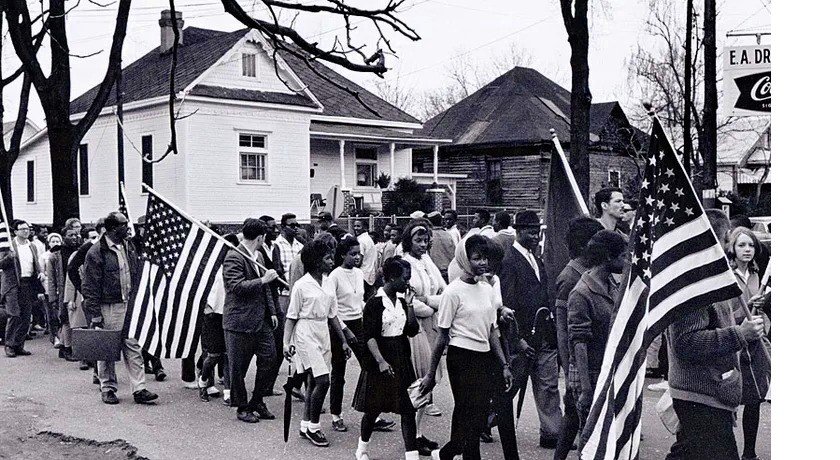Civil Rights and Protest Laws: Navigating Legal Challenges in 2024
Civil rights and protest laws in 2024 are crucial for activists. Learn about legal challenges and protections in this comprehensive guide.

Democracies require civil rights and protest legislation in order for people to be able to express their opinions and demand change. The significance of these regulations has grown in 2024 as social movements continue to influence the political and cultural environment. The ability to demonstrate is still a crucial weapon for activists working on issues like economic inequality, racial justice, and LGBTQ+ rights as well as climate change. For individuals leading these initiatives, however, understanding the intricate network of legal protections and constraints is a major problem.
Addressing current concerns requires an understanding of the evolution of Protest Laws and the historical context of civil rights. A plethora of legal obstacles, such as unauthorised arrests, the use of disproportionate force, and digital surveillance, confront today’s activists. The more we learn about the complexities of these laws, the more obvious it is that being prepared and knowledgeable is essential to standing up for change and asserting one’s rights. This article provides information and direction for anyone committed to pursuing justice by examining the state of protest laws and civil rights in 2024.
Civil Rights and Protest Laws
Historical Context
To understand the present, we must first look back. The early civil rights movements, such as the abolitionist movement and the women’s suffrage movement, set the stage for future advocacy. Key legal milestones, like the Civil Rights Act of 1964 and the Voting Rights Act of 1965, transformed societal norms and legal frameworks. Over the decades, Protest Laws have adapted, balancing the right to assemble with public safety concerns.
Modern Civil Rights Issues
Today, the fight for civil rights continues on multiple fronts. Systemic racism and inequality remain pervasive, demanding ongoing activism and legal intervention. The LGBTQ+ community fights for equal rights, including anti-discrimination laws and marriage equality. Voting rights are another battleground, with efforts to combat voter suppression and ensure fair access to the ballot box.
Understanding Protest Laws
Protest laws are designed to regulate public demonstrations, ensuring they are conducted peacefully and without disrupting public order. These laws protect protesters’ rights while also imposing certain restrictions. For instance, permits may be required for large gatherings, and there are often limitations on time, place, and manner to minimize public disruption.
Key Legal Protections for Protesters
Protesters in the United States are shielded by several legal protections. The First Amendment guarantees the right to free speech and peaceful assembly. Additionally, protesters are protected against unlawful arrest, provided they are not engaging in illegal activities. Understanding these rights is crucial for anyone participating in or organizing a protest.
Common Legal Challenges Faced by Protesters
Despite legal protections, protesters often face significant challenges. Unlawful arrests and detentions can occur, sometimes as a result of overzealous law enforcement. The use of excessive force by police is another serious issue, often leading to injuries and legal battles. Additionally, civil disobedience, while a powerful form of protest, can result in legal repercussions, including fines and imprisonment.
Case Studies
Several high-profile protests in recent years highlight these challenges. The Black Lives Matter protests, sparked by police violence against Black individuals, faced intense scrutiny and harsh law enforcement responses. The Women’s March, advocating for gender equality, also encountered legal hurdles. Climate change rallies, pushing for environmental policies, have similarly faced restrictive measures.
Role of Technology in Protests
Technology plays a dual role in modern protests. On one hand, social media platforms are powerful tools for organizing and mobilizing activists. On the other, surveillance technologies raise significant privacy concerns. Law enforcement agencies often use digital tools to monitor protest activities, leading to potential legal implications for digital activism.
Navigating Legal Challenges
For protesters, understanding and navigating legal challenges is essential. Various legal resources are available, including hotlines and legal aid organizations that provide support. If arrested, it is crucial to remain calm, know your rights, and seek legal counsel. Documenting and reporting any instances of abuse can also aid in legal battles and hold authorities accountable.
The Role of Legal Organizations
Several organizations play pivotal roles in protecting protesters’ rights. The American Civil Liberties Union (ACLU) offers legal assistance and advocacy. The National Lawyers Guild (NLG) provides support through legal observers and direct representation. Local legal aid services also offer valuable resources to those in need.
Global Perspective
Comparing U.S. protest laws with international standards offers valuable insights. Countries like Germany and the United Kingdom have their own unique approaches to regulating protests. Global civil rights movements provide lessons in resilience and strategy, highlighting the universal nature of the fight for justice.
Future of Civil Rights and Protest Laws
Potential Legal Reforms
Anticipated introduction of new laws to enhance protections for protest rights and address systemic inequalities. Potential updates to outdated laws to better reflect current societal needs and technological advancements. Efforts to fortify legal protections against unlawful arrests and excessive use of force during protests.
The Impact of Political Climate
Changes in government leadership can lead to significant policy shifts affecting civil rights and protest laws.The appointment of judges who are either more progressive or conservative can shape the interpretation and enforcement of Protest Laws. Increased lobbying efforts by civil rights organizations to influence legislative bodies in favor of stronger protections.
Technological Advancements
Growing concerns about the use of surveillance technologies by law enforcement to monitor and suppress protests. Development of laws aimed at protecting protesters’ privacy in the digital age. Potential regulations on how social media platforms handle protest-related content and user data.
Increased Public Awareness and Activism
Enhanced efforts to educate the public about their civil rights and legal protections during protests. A growing number of young people participating in civil rights movements, bringing fresh perspectives and energy. Strengthened community organizing efforts to build solidarity and support for civil rights causes.
Legal and Financial Support for Protesters
More resources dedicated to providing legal assistance to protesters, including pro bono services and legal hotlines. Increased financial support from non-profits and civil society organizations to cover legal costs for those arrested during protests. Introduction of specialized insurance policies to cover potential legal and medical expenses related to protest activities.
Global Influences and Comparisons
Adoption of best practices from other countries with robust protest laws and civil rights protections. Strengthening of international alliances and collaborations among civil rights organizations. Influence of global movements on local activism, leading to a more interconnected approach to civil rights advocacy.
Predictions for 2024 and Beyond
Continuous evolution of laws in response to emerging civil rights issues and societal changes. Increased accountability measures for law enforcement agencies to prevent abuses during protests. Persistent efforts by activists and organizations to ensure that civil rights are upheld and that protest laws protect, rather than hinder, freedom of expression and assembly.
Read More: The Role of Technology in Criminal Defence in 2024
Conclusion
In 2024, navigating the complicated terrain of Protest Laws and civil rights will be difficult but necessary for advocates of justice. Protest Laws and civil rights is critical to comprehend the legal frameworks that both support and occasionally impede protests as social movements continue to gain traction. From historical turning points to contemporary obstacles, the civil rights movement has been characterised by tenacity and resolve.
Protest Laws and civil rights critical that we remain aware and ready as we look to the future. There are legal safeguards in place, but there are also potential roadblocks to the freedom to protest. Actors may keep pushing for real change by knowing their rights, using technology responsibly, and enlisting the aid of legal organisations. The struggle for civil rights is not over, and with the correct information and tools, we can overcome these legal obstacles and get one step closer to a society that is more just and equal.
FAQs
What Are My Rights During a Protest?
You have the right to free speech, peaceful assembly, and protection against unlawful arrest. Knowing these rights is crucial for participating in protests.
Can I Be Arrested for Peaceful Protest?
While you cannot be lawfully arrested for peaceful protest, violations of specific protest regulations (e.g., lacking a permit) can result in arrest.
What Should I Do If I’m Arrested During a Protest?
Remain calm, assert your right to remain silent, and request legal counsel. Document the incident and seek support from legal aid organizations.
How Can I Support Civil Rights Movements?
Get involved by participating in protests, donating to advocacy organizations, and raising awareness through social media and community engagement.
What Legal Resources Are Available for Protesters?
Organizations like the ACLU and NLG provide legal assistance. Many local legal aid services also offer support and resources for protesters.










